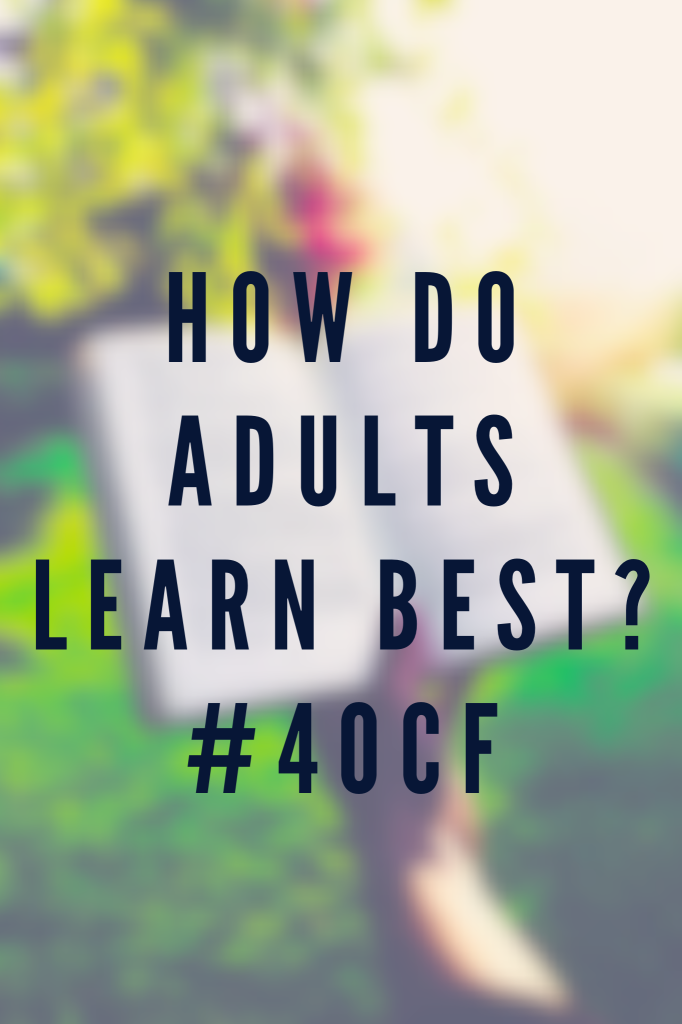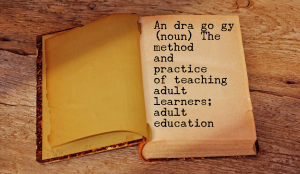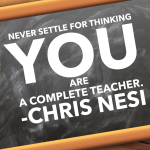I was fortunate to be able to present at ECET2 this past weekend on building a PLN through Social Media. The overall theme of the conference was cultivating effective teacher leadership, an especially important focus for the pre-service and novice teachers in attendance. Several discussions focused on the skills needed to be a successful teacher leader. A skill that kept coming up over and over again was how to collaborate and work with and lead colleagues.
During the discussion, I was introduced to a new word: Andragogy.
As a teacher leader, instructional coach, and now administrator, I have led many professional learning sessions and collaborative activities with adult learners. Rarely have I considered the differences between working with children who are learning and working with adults who are learning. When planning professional development sessions for teachers, I often model the types of active learning engagement that I would like to see teachers use with our students.
However, after doing some research into the new term, I found that there are several principles that must be considered when engaging adults in learning in order for professional learning to be successful.
Adults must want to learn. I have been to enough mandatory PD sessions to know that if teachers do not want to be there, they will not learn. Teachers must want to learn, and professional learning sessions must be meaningful and relevant. Allowing teachers to direct their own learning and providing choice can encourage teacher voice, and provide a strong motivation factor as educators continue to grow.
Adults will learn what they think they need to learn. As stated previously, we must offer PD sessions that are relevant to teachers. When teachers attend training that cannot be implemented in the classroom immediately, they often forget the training without implementing it. Providing a relevant website or instructional strategy that teachers can use in the classroom the next day gives teachers a reason to learn.
Adults learn by doing or making. One of the best sessions I saw at our District Edcamp last year was a hands-on STEM workshop. Attendees had the opportunity to participate in active STEM tasks, such as building a roller coaster model and creating newspaper towers. The teachers learned about the design process and innovation, and had several lessons ready to implement with students.
Adults bring experience to all professional learning. While children sometimes bring a lack of experience or schema to their learning, teachers often bring a great deal of both positive and negative experiences to their learning opportunities. An elementary teacher learning about a new approach for math may bring their own lack of confidence in math to the table. A teacher with a minor in science brings a different skill set to learning about the Next Gen Science Standards. When planning adult learning, we must keep in mind the strengths and weaknesses of staff.
Adults learn best in informal situations. Many of the best PD sessions that I have seen have included informal discussions or veered off of the original plan. Providing a warm and welcoming environment, and allowing teachers to feel comfortable is a great way to help adults learn. Rigid structures and protocols, as well as sit-and-get sessions do not allow teachers to make the most of PD sessions. Informal discussions and other meeting strategies can help to engage teachers in effective learning.
Many teachers who have no problem speaking in front of 25 students every day, can suddenly be frozen with fear when asked to present to adult colleagues. There are many differences between adult and child learners. This is why one must consider andragogy, in order to understand the nuances of how adults learn, while planning for engaging, interactive sessions that provide teachers with meaningful learning opportunities. With a knowledge of these adult learning characteristics, one can successfully become an effective teacher leader.
By @RACzyz
References:






Interesting, and although I don’t disagree with any of the points you make on how adults learn, I do wonder how different they really are to students. Other than the obvious difference with experience, I think these points pretty much sum up students too! Maybe students are more open to learning stuff they are not convinced they need, because they know they need to follow the teacher’s lead, but I think that is a minor difference overall.
Great post. I have always thought both adults and kids learn the same way, but you have made me reconsider this point. I did not realize that adults will learn what they think they need to learn. That does bring up an interesting dynamic while presenting to colleagues.
In my experience, I have found that adults are expected to learn and adapt quicker than we expect children to learn. Sometimes, that is just not the case. Many adults require time to digest and breakdown the information. Usually finding relevance in the material they were given. Thanks for sharing this. I have some things to consider before I hold my next math PLC meeting.